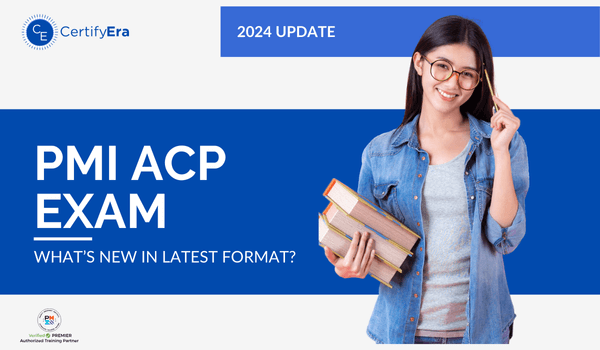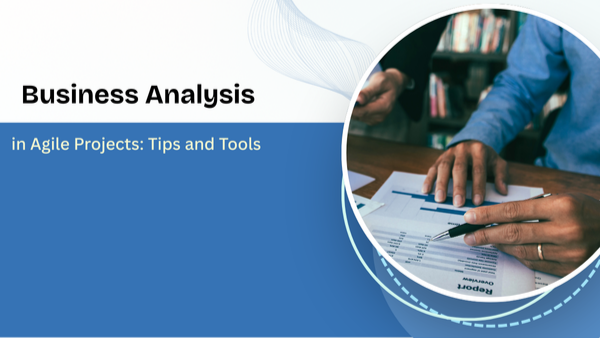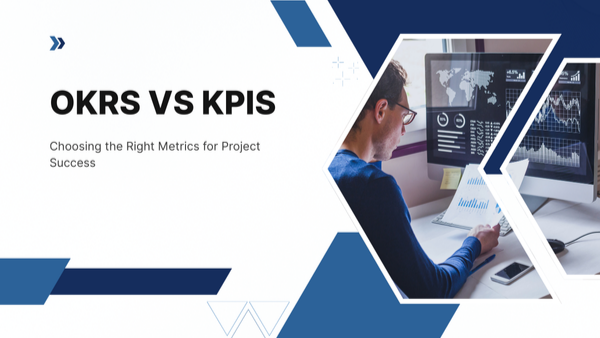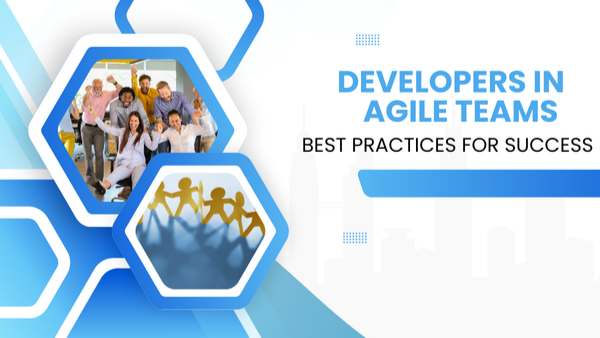
PMI-ACP Exam: What's New in the Latest Format? (2024 Update)
PMI-ACP (Agile certified Practitioner) is one of the distinguished Agile certifications offered by Project MAnagement Institute (PMI).
Table of Contents
- What is pmi acp?
- Key changes introduced in pmi-acp exam:
- Domain-specific focus areas
- Exam format
- Pmi-acp eligibility requirements
- Tools and techniques coverage in pmi-acp exam:
- Exam preparation tips
- Comprehensive exam preparation with certifyera:
- Pmi-acp exam prep course – key resources for success with certifyera:
- Conclusion
In late 2024, PMI revised the PMI-ACP Certification Examination Format with significant changes in the examination content, syllabus, question types and the exam format.
The Project Management Institute (PMI) has released its updated PMI Agile Certified Practitioner (PMI-ACP) examination format in November 2024, bringing significant changes to help agile practitioners demonstrate their expertise more effectively. In this comprehensive guide. We will explore everything you need to know about the new exam structure and requirements.
What is PMI ACP?
The PMI-ACP (Agile Certified Practitioner) certification is a globally recognized credential offered by the Project Management Institute (PMI) that validates your expertise in agile practices and methodologies. It demonstrates your ability to lead agile teams, manage agile projects effectively, and adapt to the dynamic needs of modern businesses. Unlike any other Agile Certification, PMI-ACP includes in-depth coverage of Agile methodology, mindset, values, principles and various Agile frameworks. To earn PMI-ACP certification, it comes at the cost of your commitment to learn new project management methodologies to stay ahead or current with the changing industry trends in order to deliver value to the customer early in the project life cycle meeting the urgent business needs of the customers.
Key changes introduced in PMI-ACP Exam:
PMI has transformed the earlier seven domain content of PMI-ACP into four major domains each carrying significant weightage in the PMI-ACP Examination.
The revised PMI-ACP exam features four primary domains with updated weightings:
-
Domain 1: Mindset (28%)
-
Domain 2: Leadership (25%)
-
Domain 3: Product (19%)
-
Domain 4: Delivery (28%)
Domain-Specific Focus Areas
Domain 1: Mindset (28%)
This domain emphasizes the adoption of an agile mindset, focusing on principles such as collaboration, transparency, and continuous improvement. This domain is more about engaging with internal and external stakeholders of the project in creating and delivering value to the customers. This domain tests your knowledge at adopting Agile values, principles and following the framework practices in your projects. The focus is on building a collaborative team environment encouraging frequent collaborative events enhancing transparency with the stakeholders. Building a trusted environment and culture of openness where learning and adaptation are integral parts of the process. The objective of learning and implementing Agility is to embrace change and fostering technical excellence.
Practitioners are expected to foster innovation, create environments conducive to experimentation, and embrace change proactively. The goal is to establish psychological safety within teams, shorten feedback loops, and build a culture of openness where learning and adaptation are integral parts of the process.
Agile practitioners should focus on establishing a shared vision and creating effective working agreements to align the team’s efforts. They must also cultivate high-performing teams by fostering trust, collaboration, and continuous improvement.
Leveraging insights from retrospectives is crucial for driving team enhancements and addressing challenges, including breaking down silos that hinder collaboration. Additionally, practitioners need to assess the team’s understanding of agile principles, adapt their approach to suit the team's maturity level, and determine the most suitable inter-team coordination methods to ensure seamless integration and alignment across teams.
Key areas include:
-
Early experimentation
-
Agile mindset adoption
-
Collaborative team environment
-
Transparency building
-
Psychological safety
-
Feedback loop optimization
-
Change embracement
Domain 2: Leadership (25%)
Leadership in an agile context goes beyond management, focusing on empowering teams and fostering a shared vision. This domain covers essential skills like coaching, mentoring, conflict resolution, and knowledge sharing. Agile leaders are expected to create environments of trust, motivate team members, and guide teams through challenges while promoting collective ownership of goals and ensuring alignment with organizational objectives.
Agile practitioners are required to possess the mandatory skills and knowledge to effectively lead within an agile team. This requires a thorough understanding of agile principles and methodologies, along with the ability to cultivate a collaborative team environment that encourages innovation, continuous learning, and growth.
They should apply systems thinking to analyze scenarios, assess risks, and prioritize effectively. Practitioners must also interpret agile suitability tools, adapt agile models to meet specific needs, and facilitate alignment with organizational goals.
Key competencies include establishing a clear team vision and working agreements, forming and nurturing high-performing teams, leveraging retrospectives to drive continuous improvement, and implementing collaboration practices to eliminate silos. Additionally, they should demonstrate commitment to team decisions, even in cases of disagreement, and regularly evaluate the team's agile maturity to customize approaches for maximum effectiveness.
Key areas include:
-
Team empowerment
-
Problem resolution
-
Knowledge sharing
-
Agile principles promotion
-
Shared vision development
-
Conflict management
Domain 3: Product (19%)
This domain focuses on agile product management practices, including product backlog refinement, value delivery, and increment management. Agile practitioners should possess a strong understanding of agile methodologies such as Scrum, Kanban, and Lean, and have the ability to effectively apply them in project management and product development. They should be experienced in key aspects of product development, including building product roadmaps, creating user stories, and managing product backlogs.
A strong foundation in technical knowledge is essential, enabling close collaboration with development teams to address technical requirements and constraints. Exceptional communication skills are critical for engaging with diverse stakeholders, including customers, development teams, and executives.
Practitioners should demonstrate strong leadership abilities, guiding cross-functional teams to deliver high-quality products. They must also embrace continuous learning, staying current with emerging trends and best practices in agile project and product management to drive innovation and success.
Key areas include:
-
Product backlog refinement
-
Increment management
-
Work visualization
-
Value delivery management
Domain 4: Delivery (28%)
Agile practitioners should possess the skills and expertise to effectively manage and deliver projects and products using agile approaches. Strong communication and collaboration skills are essential for working with cross-functional teams, along with proficiency in agile project management tools and techniques such as user stories, sprint planning, and retrospectives.
A solid understanding of agile development practices, including continuous integration, continuous delivery, and test-driven development, is crucial. Familiarity with agile frameworks and methodologies such as Scrum, Kanban, SAFe, and Lean is also required. Practitioners must demonstrate adaptability to evolving requirements and priorities in dynamic environments. Agile practitioners should focus on eliminating waste by prioritizing value delivery, engaging customers throughout the project, and continuously optimizing flow for efficient and timely outcomes.
Key responsibilities include leveraging agile metrics to track progress and success, seeking early feedback from stakeholders to ensure alignment with customer needs, and proactively managing risks to minimize delivery impacts.
A strong commitment to continuous learning, improvement, and a passion for delivering high-quality products and services are vital attributes for success in this role.
Key areas include:
-
Early feedback mechanisms
-
Agile metrics management
-
Risk and impediment handling
-
Waste elimination
-
Continuous improvement
-
Customer engagement
-
Flow optimization
These updated domains highlight a holistic approach to agile practices, reflecting the evolving demands of the agile profession.
Exam Format
-
Total number of questions: 120
-
No.s of Scoring questions: 100
-
No. of pretest questions: 20
-
Total Exam duration: 3 hours
-
No. of Scheduled breaks: 1 (can be availed after question no. 60)
Different types of questions in the new PMI-ACP Exam Format:
-
Multiple-choice questions
-
Multiple-response questions
-
Drag-n-Drop questions (Enhanced matching questions)
-
Hot-spot questions
PMI-ACP Eligibility Requirements
To be eligible for the PMI-ACP certification, you need to meet the following certification program requirements, defined by the Global Practice Analysis:
|
Educational Background |
Professional Learning |
Professional Agile Experience |
|
Secondary diploma (high school diploma, GED, associate's degree or global equivalent) |
28 hours of formal training in agile practices, frameworks, methodologies |
2 years of agile experience in past 5 years* |
|
OR |
||
|
1-year agile experience and degree from Global Accreditation Center (GAC) program |
||
|
OR |
||
|
1-year agile experience and active 3rd party agile certification (current and earned more than 1 year ago)** |
||
|
OR |
||
|
Active PMP® Certification |
||
|
*Current PMI Certification holder’s (e.g. PgMP®) agile and hybrid experience will count towards experience requirements (experience must be within the past five years) ** Current agile certification that demonstrates knowledge of Agile approaches and principles |
||
Tools and Techniques Coverage in PMI-ACP Exam:
The exam tests knowledge of various tools and techniques, including:
-
Agile Analysis and Design
-
Estimation Methods
-
Communication Approaches
-
Metrics and Measurements
-
Planning and Monitoring
-
Process Improvement
-
Product Quality
-
Risk Management
-
Value-Based Prioritization
Exam Preparation Tips
-
Study Strategy
-
Focus on the four domains according to their weightings
-
Practice with multiple question formats
-
Utilize PMI’s official study materials
-
Resource Management
-
Plan for the 3-hour exam duration
-
Take advantage of the mid-exam break
-
Practice time management with sample questions
-
Training Documentation
-
Ensure training hours are properly documented
-
Maintain proof of course completion
-
Verify alignment with exam content outline
Comprehensive Exam Preparation with Certifyera:

Certifyera equips aspiring PMI-ACP candidates for success by providing a structured and comprehensive approach to exam preparation. Our training programs emphasize mastering the four domains in alignment with their weightings, ensuring a focused study strategy tailored to PMI's official guidelines. Through diverse practice question formats and official study materials, we help candidates build confidence and familiarity with the exam structure. Our resources are designed to optimize time management, guiding candidates to effectively plan for the 3-hour exam duration, make the most of the mid-exam break, and hone their pacing with sample questions. Additionally, Certifyera ensures seamless documentation of training hours, proof of course completion, and alignment with the exam content outline, empowering candidates to meet all eligibility requirements with ease and excel in their PMI-ACP certification journey.
PMI-ACP Exam Prep Course – Key Resources for Success with Certifyera:
If you're planning to take the PMI-ACP exam and need guidance to navigate the updated PMI-ACP syllabus, Certifyera is here to support you. This guide highlights essential resources to help you ace the PMI-ACP exam with confidence.
PMI-ACP Training with Certifyera
As an Authorized Training Partner of PMI (Project Management Institute), Certifyera is fully equipped with updated learning materials and effective teaching techniques aligned with the latest PMI-ACP Exam Outline. Training at CertifyEra is conducted by the Authorized Training Instructors of PMI which is an added advantage. Our training programs are designed to suit your unique requirements and availability, ensuring a flexible and comprehensive learning experience. Certifyera's PMI-ACP Course includes hands-on training through case studies, group discussions, instructor-led workshops, and self-paced modules. Additionally, you'll gain access to exclusive study materials and practice assessments to solidify your knowledge.
Mock Exams by Certifyera
Certifyera offers expertly crafted PMI-ACP mock tests and practice exams that closely mirror the actual exam format. These tests help you evaluate your understanding of the syllabus, identify areas for improvement, and refine your test-taking strategies. By simulating real exam conditions, Certifyera’s mock exams prepare you to manage time effectively and tackle the PMI-ACP exam with ease.
Embark on your journey to becoming PMI-ACP certified with Certifyera, where expert guidance and top-notch resources pave the way to your success.
Conclusion
The 2024 PMI-ACP exam update reflects the evolving landscape of agile project management. With its comprehensive coverage of agile principles, practices, and methodologies, the certification continues to be a valuable asset for agile practitioners worldwide. Understanding these changes and preparing accordingly will be crucial for exam success.
Remember to check PMI’s official website for the most current information and updates regarding the PMI-ACP certification process.
Last updated: December 2024

About Anita Ankam
Anita Ankam – Expert Project Management Instructor
Anita Ankam is a highly experienced and certified project management instructor, specializing in globally recognized methodologies such as PMP®, PMI-ACP®, DASM®, and DASSM®. With an extensive academic background, including an MBA and MSc, Anita holds multiple industry-leading certifications, including PRINCE2, PRINCE2 Agile Practitioner, CSM, ASM, ITIL, and Six Sigma Black Belt.
As an authorized training instructor, Anita has guided countless professionals in mastering project management frameworks and agile practices. Know more.
Related Posts

Featured Links
Contact us
- PMP® Certification Course |
- CAPM Certification Course |
- PMP Certification Training in Mumbai |
- PMP Certification Training in Pune |
- PMP Certification Training in Hyderabad |
- PMP Certification Training in Delhi |
- PMP Certification Training in Chennai |
- PMP Certification Training Course in Ahmedabad |
- PMP Certification Training Course in Bangalore |
- PMP Certification Training Course in Bhubaneswar |
- PMP Certification Training Course in Chandigarh |
- PMP Certification Training Course in Gandhinagar |
- PMP Certification Training Course in Faridabad |
- PMP Certification Training Course in Dombivli |
- PMP Certification Training Course in Coimbatore |
- PMP Certification Training Course in Ghaziabad |
- PMP Certification Training Course in Gurgaon |
- PMP Certification Training Course in Indore |
- PMP Certification Training Course in Jaipur |
- PMP Certification Training Course in Mysore |
- PMP Certification Training Course in Lucknow |
- PMP Certification Training Course in Kolkata |
- PMP Certification Training Course in Kochi |
- PMP Certification Training Course in Nagpur |
- PMP Certification Training Course in Navi Mumbai |
- PMP Certification Training Course in Patna |
- PMP Certification Training Course in Pimpri |
- PMP Certification Training Course in Vadodara |
- PMP Certification Training Course in Trivandrum |
- PMP Certification Training Course in Thane |
- PMP Certification Training Course in Surat |
- PMP Certification Training Course in Noida |
- PMP Certification Training Course in Visakhapatnam |
- PMP® Certification Training Course in Doha |
- PMP Certification Training in New York |
- PMP Certification Training Course in Chicago |
- PMP Certification Training in Austin |
- PMP Certification Training in Minneapolis |
- PMP Certification Training in Atlanta |
- PMP Certification Training in Dallas |
- PMP Certification Training in San Diego |
- CAPM Certification Training in Mumbai |
- CAPM Certification Training in Bangalore |
- CAPM Certification Training in Hyderabad |
- CAPM Certification Training in Delhi |
- CAPM Certification Training in Pune |
- CAPM Certification Training in Chennai |
- CAPM certification Training in Kolkata |
- CAPM certification Training in Gurgaon |
- CAPM certification Training in Noida |
- CAPM Certification Training in Ahmedabad |
- PMI Certified Professional in Managing AI (PMI-CPMAI)™ |
- PMI-RMP - PMI Risk Management Professional |
- PMI-PMOCP - PMI® Project Management Office Certified Professional
- AZ-900: Microsoft Azure Fundamentals |
- AZ-104: Microsoft Azure Administrator |
- AZ-204: Developing Solutions for Microsoft Azure |
- AZ-305: Designing Microsoft Azure Infrastructure Solutions |
- AZ-400: Designing and Implementing Microsoft DevOps Solutions |
- AZ-500: Microsoft Azure Security Technologies |
- AI-900: Microsoft Azure AI Fundamentals |
- DP-900: Microsoft Azure Data Fundamentals |
- CLF-C02: AWS Certified Cloud Practitioner |
- GCP-FC: Cloud Digital Leader |
- GCP-ACE: Associate Cloud Engineer |
- GCP-PCA: Professional Cloud Architect |
- GCP-PCD: Professional Cloud Developer |
- GCP-PCE: Professional Cloud DevOps Engineer |
- GCP-PDE: Professional Data Engineer |
- GCP-PCNE: Professional Cloud Network Engineer |
- GCP-PCSE: Professional Cloud Security Engineer |
- GCP-ML: Professional Machine Learning Engineer |
- GCP-PBA: Professional Business Intelligence Analyst |
- DP-100: Designing and Implementing a Data Science Solution on Azure |
- DP-203: Data Engineering on Microsoft Azure
- PMP® is a registered mark of the Project Management Institute, Inc.
- CAPM® is a registered mark of the Project Management Institute, Inc.
- PMI-ACP® is a registered mark of the Project Management Institute, Inc.
- Certified ScrumMaster® (CSM) ia a registered trademark of SCRUM ALLIANCE®
- While we strive to ensure that all prices listed on our website are accurate, we reserve the right to modify them at any time without prior notice.
Copyright © Certifyera Consulting Services. All Rights Reserved | Designed and Developed by WebAnaya


